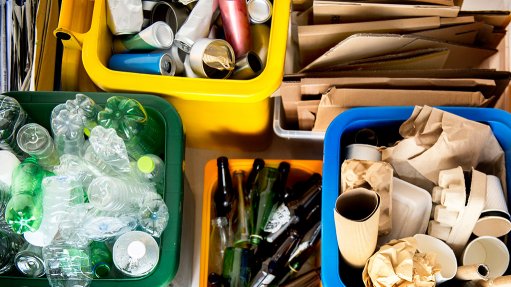
FIRST STEP Awareness must be created that separation at source rather than landfill and bin waste picking results in a cleaner product for mills
Paper recycling in South Africa is thriving, owing to the efforts of industry, collectors and conscientious businesses and consumers, says South African paper recycling association RecyclePaperZA GM Anele Sololo.
The country reached its paper recycling 2020 target of 70% in 2017, with 1.3-million tons of paper, as well as paper, boxes and liquid packaging kept out of landfill. Last year’s paper recovery figures are yet to be released.
Sololo tells Engineering News that RecyclePaperZA continues to encourage separation at source through various partnerships. “Our members are heavily invested in ensuring that good-quality, clean paper fibre is recovered in an economically viable way for the production of new paper-based products.”
She notes that the first step of recycling is separation at source and that improving it in this regard is “a low hanging fruit”.
“This is about you and me: people in their homes, people in their workplaces and at their schools putting in place measures that allow for efficient and effective separation at source,” Sololo points out.
This would involve separate bins for waste and recyclables. She notes that placing one recycling bin in an office, for example, will not encourage people to recycle – it needs to be easier for people. An Australian study showed that paper recycling rose from 28% with one bin per office to up to 94% when paper trays were located on desks.
She says recycling is about awareness and education, and knowing what is recyclable and what is not.
Only 13% of South African households recycle regularly and even fewer businesses recycle effectively, according to RecyclePaperZA.
Further, separation at source gives people who collect waste for a living “stories of dignity” which should be told, she notes. Awareness must be created that separation at source results in a cleaner product that goes into a mill, which will enable a waste collector to earn more for every ton. It also reduces the time a collector takes to work his or her route.
When paper is contaminated, its recyclability is reduced; therefore, effective separation at source initiatives are crucial, Sololo emphasises.
Meanwhile, she says building small enterprises in the recycling economy is crucial and RecyclePaperZA is involved in several initiatives. The association runs municipal workshops in collaboration with nonprofit organisation the National Recycling Forum to inform especially the recycling community about how to manage their businesses more effectively and available funding.
RecyclePaperZA is also working with the City of Ekurhuleni metropolitan municipality to roll out a pilot separation-at-source programme that will benefit waste pickers and informal collectors. RecyclePaperZA also runs school programmes, connecting schools with local collectors that service the schools.
Further, the association offers its entrepreneurship training course that teaches basic business skills to better equip recycling collector entrepreneurs to grow their businesses. RecyclePaperZA has, to date, trained almost 7 000 such entrepreneurs, Sololo highlights. RecyclePaperZA is also partnering with Umfolozi College, in KwaZulu-Natal, to pilot a registered and accredited course which has been developed by industry through the Quality Council of Trades and Occupations.
“This will ensure that those who participate in the course receive a formal and recognised qualification, creating opportunities for businesses in the recycling value chain,” she concludes.